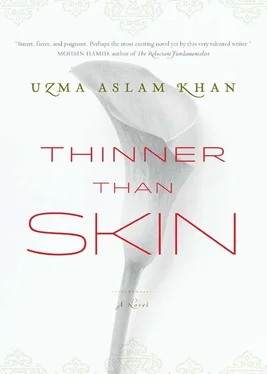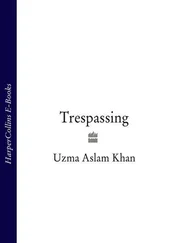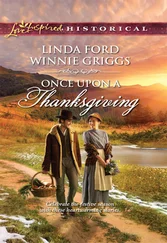I thought it a beautiful thing. The most beautiful thing I’d seen. A pilgrimage to love.
We were told it was bad luck for other eyes to watch. Eyes from somewhere else. Karachi eyes. Peshawar eyes. But even then I’d not been able to resist. I’d taken out my camera and aimed. Had it brought us bad luck?
I left this detail out as well.
“What happened next?” She rolled onto her back, said the ice imagery was making her thirsty. I put wet glasses in the freezer for dark beer later. Then I told her the rest. The elders waited politely for the male and female glaciers to finish in their marital bed, after which the porters shielded the hole with a mat of grass, wheat husks, and walnut shells that they’d uncover in the winter, so the snow could collect around the two ice blocks. When the female was fat, freshwater children would spring from her womb and the village would drink them and irrigate their fields with them. After five winters, the couple would begin to creep downhill as one, becoming a natural glacier.
I always concluded by asking, “And you, what’s your most beautiful moment?”
She never hesitated. “The way you looked at me, the first time, standing down in the sand on Baker Beach in your trousers while I sat sunning myself on the rocks. You compared me to a calla lily. That was the moment.”
The first time she said it, I had to look away. I was the best thing to happen to her? Me? I did not deserve my luck. I know I did not, or I would have seen that it was when we played together in her window and I received her unguarded love, these were my most beautiful moments. They were not witnessed. They were lived.
We played differently now.
Glaciers in the eastern Himalayas are receding. Some say the Alps will be ice-free by 2100. Greenland’s glaciers are melting so fast they could sink southern California and Bangladesh. But in parts of Pakistan, glaciers could be expanding. It was a possibility Wes and Farhana had come to explore.
We finally left our cabin, though not as early as I’d have liked. Wes and Farhana decided to scrape up every last bite of my cold omelette too; perhaps the air was making them hungry. An hour later, as I watched Farhana trek up the glacier to Lake Saiful Maluk with Wes, I feared her love for me was like a Pakistani glacier. It was difficult to say if it was growing or retreating.
What did she love about them? Glaciers, I mean. They weren’t shady or concealed, nothing marshy there, except perhaps the slushy, slippery surface. Unlike her, glaciers were slow-moving, sluggish, with bouts of extreme rage. Between stasis and thrust, they rattled and creaked, moaned and bickered, adjusting and readjusting their old, old bones. Like a ghost in the family, and unlike Farhana, they were insistent lingerers. (Granted, she did linger over those damn eggs.) Snails must be born of them. (I once made a photo-collage of a glacier speckled in snails; the snails looked like little glacier turds.) Was that the attraction — the promise of a deep, stubborn rootedness? Rejection of the New World? Here in the land to which she “returned,” she found glaciers that weathered global gas emissions and spurned newness. Except this wasn’t true, of course. Glacial growth and decline were equal indicators of global warming, as she herself liked to remind me, and if glaciers were growing in the Old World, they were also growing in the New. They were growing in Mount Shasta in northern California, for instance, and Farhana was here to compare the rate of growth in the western Himalayas to that of the southern Cascades.
Apart from returning, of course.
There were others trekking up the glacier with us, as well as a line of jeeps, all heading up to the lake, all leaving brown scud marks across the glittery white expanse. (Snails!) The jeeps slid across the ice, white-knuckled drivers steering wheels that kicked like steeds. To our right was a drop thousands of feet down into the river. I peered over the edge. A school bus lay on its side. I overheard the driver of one jeep tell his passengers that the accident was only two days old. There were no survivors. A whiff of hashish circled us as the jeep continued up.
Leaning over the edge, Irfan said the schoolchildren had probably been listening to their teacher tell the story of how the lake got its name, just as the bus had skidded.
“What a happy thought,” I replied.
“She had probably just gotten to the part about the prince falling in love with a fairy princess,” he added cheerfully. “Or the part about the jinn.”
I looked at him. With his clipped pointy beard and sharp cheekbones, Irfan had an elfin look about him, except that his eyes, hard with sorrow, belonged to this world. He had a way of hunching his shoulders and pursing his lips when reminded of all that caused him pain, which was most things. His wife Zulekha had died soon after their marriage; she’d died in a car hijacking in Karachi, on her way home from a wedding with her brother. The hijackers had shot them both before driving off with her Honda Civic. Irfan was near Kaghan when it happened, working on a water management project for a Norwegian company. It was before the days of the cell phone. He returned to Karachi to find his wife already buried.
In America, a shrink would say Irfan needed closure. In Pakistan, he needed God. But he lost Him when he lost his wife, and his brooding posture enfolded a man nothing like the Irfan I’d gone to school with, the one with whom I’d trekked across these valleys before, to see the mating of glaciers. I thought it was to remember being here with Zulekha that Irfan had changed the plan and decided on this detour to Kaghan. I assumed it wasn’t entirely because Farhana loved forests.
Now I mumbled, “A lot has changed since we were here last.”
He grinned, somewhat devilishly, as if to say, all for a Honda Civic .
As I raised my arm to offer something — perhaps a thump of camaraderie to his back — I nearly slipped. I pulled his jacket for balance and we found our footing barely two inches from the edge.
“Not even a fairy princess is worth falling for,” he laughed as we turned away from the bus to follow Farhana and Wes back up the glacier.
They were far ahead of us now, two tall figures, both identifiable by the color of their coats — Farhana a red blur, Wes a mustard — the ends of her braid occasionally scattering sunlight across my field of vision like a lens flare. They were probably taking readings as they went; people seemed to be watching them. I walked in the dirt track her shoes left behind as the glacier creaked. There were unimaginable pressures stored in the ice beneath our feet.
This morning, as we lay in bed in our cabin, before Wes and Irfan disturbed us, I’d told Farhana the story about the jinn and the lovers. She lay on her back, knees slowly tracing arcs in the air, casting spells across her damp bush. Before she pulled the covers over her, for those few moments, we were naked together, enjoying the warmth we still held between us. I was glad there were no dishes to wash in our cabin and no access to email, or I could never have kept her there long enough to whisper the tale in her ear.
“There was a jinn who fell in love with a fairy princess. The jinn was the guard of Malika Parbat, the mountain that borders the lake.”
“And Malika Parbat means?”
“Queen of the Mountains.”
“Go on.”
“The fairy princess was called Badar Jamal, and she was a water creature, all silvery and slight, dipping in and out of the lake, stretching pleasingly on Malika Parbat’s slopes. The jinn would watch her. Trouble was, a prince began watching too. He was called Saiful Maluk, and he came from across the steppes.”
Читать дальше












